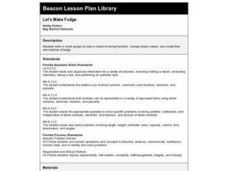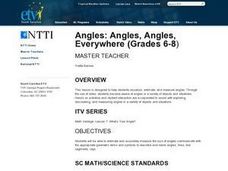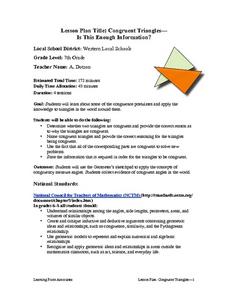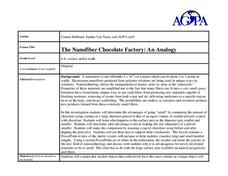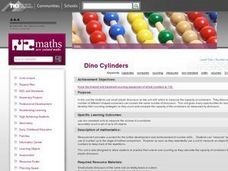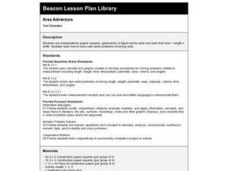Curated OER
Let's Make Fudge
Students make fudge after reading fractional values in recipes and finding equivalent fractions to those presented in the recipes. They study measurement abbreviations.
Curated OER
Angles: Angles, Angles, Everywhere
Students practice estiminating and measuring angles. After watching a short video, they identify angles in objects in the classroom and their homes. In groups, they participate in activities in which they are given a scenerio and are...
Curated OER
Weather Dot Com
Students examine the need for a standard unit of temperature and measure temperature with a thermometer. They discuss the details of a thermometer and the calibrations used, record temperature data for inside and outside, explore...
Curated OER
The Relationship Between Salinity and the Density of Water
Students investigate density and salinity of water. In this density and salinity lesson plan, students find the density of objects and liquids and show the relationship between the salinity and density of water. Students add salt to...
Curated OER
Congruent Trianges - Is This Enough Information?
Seventh graders determine whether two triangles are congruent and provide an explanation to why they are not. They apply concepts of measurement of angles and collect evidence of congruent angles in the world.
Curated OER
The Nanofiber Chocolate Factory: An Analogy
Students investigate Nanotechnology. In this physic's lesson, students evaluate a hands-on model made from chocolate syrup and pretzels to determine the advantages of size. Students weigh chocolate syrup to determine it's wait...
Curated OER
Burn, Baby Burn (Or Not)
Physics learners apply the concepts of fluid pressure input and output to firefighting. Divide your class into small groups and give them each a few cards that list nozzle type, hose length, hose size, and structure dimensions, They are...
Curated OER
Worms And More
Learners complete five center activities that in order to determine the attributes of length and area. They study the vocabulary associated with measurement of length and area. They use blocks, play dough, wrapping paper, and footprints...
Curated OER
How Long is a Slinky?
Students take part in a variety of measurement tasks. Students measure the length of a slinky. Students work out how many slices of tomato will fit around the edge of a pizza. Students measure the label from a can accurately.
Curated OER
Is It There?
Students participate in a lesson designed to illustrate these concepts using simple materials. They use Science process skills to observe, measure, predict, make inferences, and communicate while completing the activity. Proper safety...
Curated OER
Perimeter
Learners use their hands, feet, computer, and rulers to measure the perimeter of objects. For this measurement lesson plan, students measure objects around the room and computer generated shapes.
Curated OER
Pirate Plays
Students performing a scene about pirates and spend time making a measuring meters incorporating the main character, Captain Blood to add interest. They use meter sticks measuring items from the play and record their answers in meters.
Curated OER
Floating Pencil
Students discover how salt water makes a pencil float better than freshwater by measuring and comparing the lengths of the portion of the pencil that floats above the water surface. They then determine if an unknown water sample is...
Curated OER
Pounds and Ounces: It's All About Weight
First graders explore number sense by participating in a measurement estimation activity. In this weight lesson, 1st graders discuss the differences between measurement units, both English and Metric. Students examine a loaf of bread to...
Curated OER
Scale Matters
Third graders study the meaning of the digits an any whole numbers with up to 3 decimal places. They order decimals with up to 3 decimal places and perform measuring tasks, using a range of units and scales.
Curated OER
Dino Cylinders
Students investigate the capacity of containers using small dinosaur figures as the unit of measure. They work with a number of different shaped containers to compare the capacity as they practice counting the dinosaurs. They complete an...
Curated OER
Design an Apartment
Students are given the task of designing an apartment. In groups, they practice estimating the area and perimeter of different shapes. After designing their space, they apply the same formulas to solving real-world story problems.
Curated OER
Measuring with Mathematics
Eighth graders discover how the change in the dimensions of a shape cause a change in the overall area of the shape, but the perimeter stay the same. They, in groups, go out to the playground and construct large areas using stakes and rope.
Curated OER
Measuring Angles
Third graders describe an amount of turn from a particular position to another using the 'circular' benchmarks of 0, ++, ++, ++, and full turn. Estimation language such as 'just about', 'between', 'not quite', 'just over', and similar...
Curated OER
Surface Area with Polydrons
Students explore measurements by analyzing geometric shapes. In this surface area lesson, students identify the terms volume, weight, perimeter and area in order to find the requested measurements of specific polygons. Students utilize...
Curated OER
Mini-Metric Olympics
Eighth graders participate in the mini-metric Olympics. In this measurement instructional activity, 8th graders solve real-world problems that require them to calculate length, area, and volume in metric units.
Curated OER
Dream Bedroom Floor Plan
Students construct using Cabri software. In this geometry instructional activity, students convert between units and apply the correct measurements to build objects. They create the room virtually and manipulate the shapes to the desired...
Curated OER
Shadows
Students conduct an experiment. In this shadows lesson, students record the height of a meter stick. Students then cast shadows and record their length. Students compare the length of the shadow with the actual height of the meter stick.
Curated OER
Area Adventure
Students calculate the area of figures using the formula: length x width = area. They solve area problems using paper squares, geoboards, and real-world problems.
